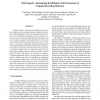298 search results - page 6 / 60 » Towards experimental evaluation of code obfuscation techniqu... |
ACSAC
2006
IEEE
14 years 1 months ago
2006
IEEE
Modern malware often hide the malicious portion of their program code by making it appear as data at compiletime and transforming it back into executable code at runtime. This obf...
SP
2009
IEEE
14 years 2 months ago
2009
IEEE
Malware authors have recently begun using emulation technology to obfuscate their code. They convert native malware binaries into bytecode programs written in a randomly generated...
TPDS
2002
13 years 7 months ago
2002
Many large scale applications have significant I/O requirements as well as computational and memory requirements. Unfortunately, the limited number of I/O nodes provided in a typic...
CORR
2007
Springer
13 years 7 months ago
2007
Springer
— It has been observed that particular rate-1/2 partially systematic parallel concatenated convolutional codes (PCCCs) can achieve a lower error floor than that of their rate-1/...
TIME
2009
IEEE
14 years 2 months ago
2009
IEEE
—The anonymization of location based queries through the generalization of spatio-temporal information has been proposed as a privacy preserving technique. We show that the prese...

